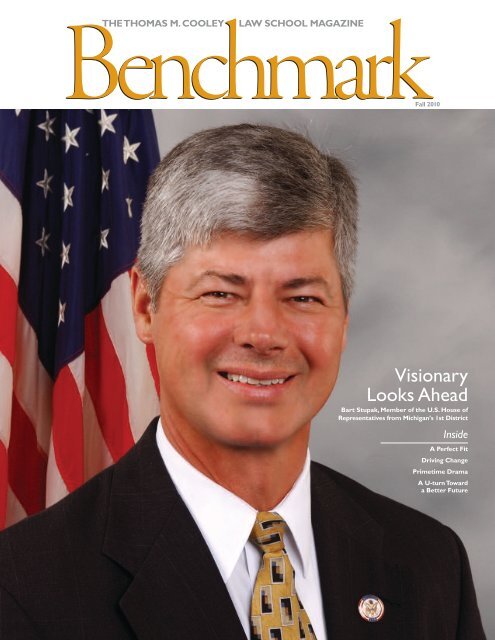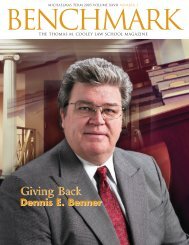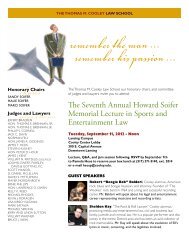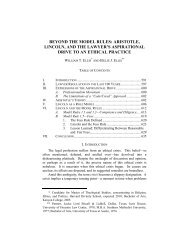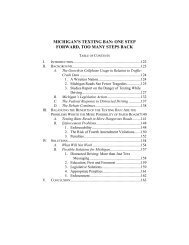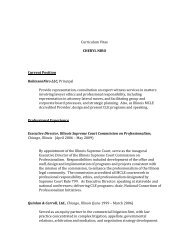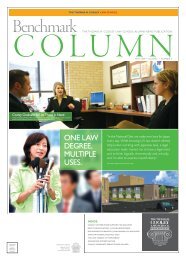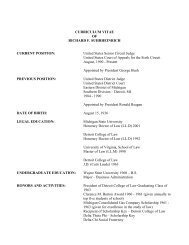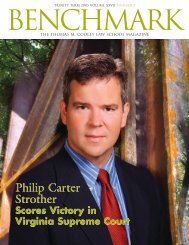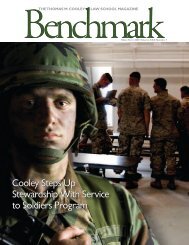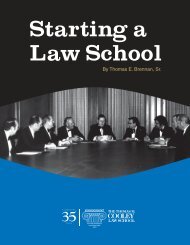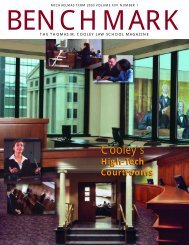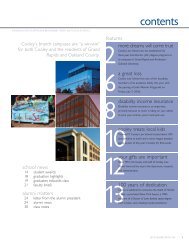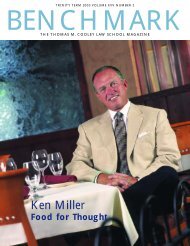Visionary Looks Ahead - Thomas M. Cooley Law School
Visionary Looks Ahead - Thomas M. Cooley Law School
Visionary Looks Ahead - Thomas M. Cooley Law School
- No tags were found...
Create successful ePaper yourself
Turn your PDF publications into a flip-book with our unique Google optimized e-Paper software.
ICG.0410.003.BMBenchmarkThe <strong>Thomas</strong> M. <strong>Cooley</strong> <strong>Law</strong> <strong>School</strong>Alumni MagazineEditorTerry CarellaCo-Editor/WriterSharon MatchetteContributing WritersSeyferth PRDesignImage Creative GroupPhotographyCover Image © CongressmanStupak’s officeDriving Change Article© Gennara PhotographyCall for SubmissionsThe Benchmark is seeking story ideasfrom graduates. We are looking for storieson a variety of subjects such as graduateachievements, international law, culturaldiversity, legal information helpful to practitioners,unique law practices, advice toprospective law students, and special events.If you would like to share a story idea,please write, call, or e-mail:Communications Office<strong>Thomas</strong> M. <strong>Cooley</strong> <strong>Law</strong> <strong>School</strong>P.O. Box 13038Lansing, MI 48901Phone: (517) 371-5140 ext. 2916Fax: (517) 334-5780E-mail: communications@cooley.eduLetter from <strong>Cooley</strong>Dear Alumni and Friends,I am constantly amazed by the great things that our graduates do. Many are fine practitioners of the law. Manyothers take the principles of analysis learned at <strong>Cooley</strong>, combine them with other skills, and succeed in a varietyof professions.This issue of Benchmark features a sampling of individuals who are doing great things with their legal educations.United States Congressman Bart Stupak (page 2-5) is a trusted leader in our nation who cast one of thedeciding votes in the passage of health care reform. His classmate, Edward Gibson (page 14-17), is a formerFBI special agent who helped to bring down a double agent in addition to serving as a chief cyber securityadvisor for Microsoft.Then there is Diane Dietz (page 6-9), one of the most talented women’s basketball players to ever playcollegiately. She has combined the legal expertise gained at <strong>Cooley</strong> and honed in the fieldwith great knowledge in the arenas of sports and communications to lead the Big Ten Conference’scommunications efforts.These are just a few of the great stories that I’m proud to share in this edition of Benchmark. Many others, includingthe great work of Sparrow Health System President Dennis Swan, and recent graduate Ben Symko (recentlynamed one of the United States’ 10 Outstanding Young Americans by the United States Junior Chamberof Commerce) also are featured in the fall issue.Our graduates are truly an inspiration, not only to their fellow alumni, but to our current students.We’re proud to call each and every one of you a member of the <strong>Cooley</strong> <strong>Law</strong> <strong>School</strong> family.Sincerely,James D. RobbAssociate Dean of Development and Alumni RelationsPostmark: Benchmark is published twice ayear by the administrative offices of the<strong>Thomas</strong> M. <strong>Cooley</strong> <strong>Law</strong> <strong>School</strong>, P.O. Box13038, Lansing, MI 48901robbj@cooley.eduALUMNI DATABASEThe user name will always remain the wordalumni. The password changes are disclosedin Benchmark on the inside front cover.Please call the Alumni Relations Officeat 517-371-5140, ext. 2038, or e-mailalumni@cooley.edu if you have any problems.
contentsTHOMAS M. COOLEY LAW SCHOOL BENCHMARK FALL 20102VISIONARY LOOKSAHEADNine-term Congressman BartStupak (Dethmers Class, 1981)readies for life’s next chapter.6A PERFECT FITDiane Dietz (Morell Class,1985) is leading the Big TenConference communicationsefforts through unchartedwaters.10DRIVING CHANGEDennis Swan (Morell Class,1985) always knew he wouldgo to law school. He justdidn’t know it would be atnight while serving as thevice president of a majorhealth system.14PRIMETIME DRAMAThe biography of EdwardGibson (Dethmers Class,1981) reads like that of acentral character in a primetimetelevision drama.18A U-TURN TOWARD ABETTER LIFEBen Symko (Adams Class,2008) makes national list ofoutstanding young Americansonly a dozen years afterdropping out of high school.<strong>Cooley</strong> News pg. 20-21• <strong>Cooley</strong>’s Auburn Hills campus servesas new home to historic legal texts• <strong>Cooley</strong> <strong>Law</strong> <strong>School</strong> professor chosen for“What the Best <strong>Law</strong> Teachers Do”study• <strong>Law</strong> Review Symposium features leadingexperts on Article V of the U.S. Constitution• Associate Dean becomes fourth <strong>Cooley</strong>official in five years to win major awardfrom the State Bar of MichiganBENCHMARK FALL 2010 COOLEY.EDU1
VISIONARYLOOI(SAHEADNine-term Congressman Bart Stupakreadies for life’s next chapter2 BENCHMARK FALL 2010 COOLEY.EDU
featureNine-term Congressman Bart Stupak(Dethmers Class, 1981) readies for life’s next chapterIn 2014, an estimated 32 million Americanswill begin receiving new insurance benefitspreviously unavailable to one of the neediestsegments of the nation’s population.The Patient Protection and Affordable CareAct (Public <strong>Law</strong> 111-148), better known asHealth Care Reform, could be considered oneof the most hotly debated pieces of federallegislation ever signed into law.Regardless, a <strong>Cooley</strong> alumnus is standing tallin his role of advocating for this sweepinghealth policy change that will ultimately affecteverything from the cost of insurance to howhealth care services are delivered throughoutthe country.A pro-life Democrat, Stupak opposed languagein the original bill that would include funding forelective abortions. He successfully negotiatedwith leaders of Congress and President Obamato issue an Executive Order to prevent thefunding of elective abortions and, subsequently,cast one of the deciding votes in support of thebill. The late-hour vote catapulted Stupak intothe national spotlight and elicited strong wordsfrom both sides of the aisle.HEALTH REFORM:HALLMARK OF HIS CAREERStill, health care policies will likely be hailed asthe hallmark of Stupak’s distinguished 20-yearpolitical career, which has spanned nine termsand produced hundreds of pieces of legislation.The perennial incumbent has opted not to seeka 10th term and will retire from public office atthe end of the year.Being thrust into the national spotlight is nothingStupak envisioned 38 years ago while working asa police officer in Michigan’s Upper Peninsula.An avid outdoorsman, Stupak loved his earlycareer days working outside and on the road.While the rural Caro, Michigan state post wherehe worked had its share of crime, the realities ofhis crime-fighting job came crashing down onhim following the death of a good friend.“I was 28 and thought, what else can I dowith my life?”His wife, Laurie, suggested that he considerlaw school.The idea took hold.(continues)BENCHMARK FALL 2010 COOLEY.EDU3
featureStupak was elected to the U.S. House ofRepresentatives in 1992 and has achievedre-election ever since.A FLEXIBLE LAW SCHOOLSCHEDULEAbout this time, the Michigan State Policetransferred Stupak to a specialized unit inLansing -- the backyard of <strong>Cooley</strong>’s originalcampus. The law school’s flexible eveningschedule allowed Stupak to balance his joband studies. He graduated from <strong>Cooley</strong>three years later.Ironically, Stupak experienced a knee injury in1982, resulting in a degenerative condition.Unable to keep up with the intense physicalrequirements of his position, he was medicallyretired from the state police force.Armed with his law degree, Stupak enteredprivate practice back in the Upper Peninsulaand soon took a first-time and successful runfor the Michigan House of Representatives,serving Menominee, Delta and Dickinsoncounties. He was elected to the U.S. Houseof Representatives in 1992 and has achievedre-election ever since.During his impressive tenure, Stupak hasgrappled with everything from environmentalprotection of the Great Lakes – one of hissignature priorities – to severely restricting thecontroversial acne drug Accutane from pharmacyshelves. His passion for restricting the drug wasalso rooted in personal tragedy; the Stupak’syoungest son, Bart, Jr, died after takingAccutane. Stupak believes the medicationcontributed to his son’s death.Today, the controversial drug now comeswith “warnings galore,” Stupak said.TIME-TESTED COOLEYTEACHINGSThe time-tested rigors of <strong>Cooley</strong> teachings,including the school’s emphasis on criticalthinking, continue to support him at everyturn in his career.In September 2010, Stupak, Chairman of theOversight and Investigations Subcommittee,was preparing for hearings on the salmonellapoisoning outbreak in eggs.“You have to know both sides of the issue; inthis case, you need to anticipate what the eggfarmers are going to say,” he said. “It’s verydetailed, critical thinking.”4 BENCHMARK FALL 2010 COOLEY.EDU
featureBIRTHDATE:February 29, 1952Age: 58RESIDENT:Menominee, Mich.FAMILY:Married 36 years to Laurie.Son, Ken, a graduate of PepperdineUniversity <strong>School</strong> of <strong>Law</strong>UNDERGRADUATE STUDIES:Bachelor’s Degree in CriminalJustice, Saginaw Valley State UniversityYEARS IN OFFICE:18 – United States House ofRepresentativesFAVORITE PASTIMES:Anything to do with the outdoorsor sports. He’s a Green BayPackers fan, loves college sportsand roots for the Detroit Tigers.His current position, which also involvesmembership on three subcommittees forthe Committee on Energy and Commerce,leaves little down time. A resident ofMenominee, Stupak travels to Washington,D.C. weekly. Serving one of the country’slargest geographic districts keeps Stupakmoving, even when he is in Michigan.“There are some months I may not return tomy home at all,” he said.No matter where he stops in his district,which extends 600 miles from end to end,Stupak said nearly all of the residents hecomes in contact with share similar concernsabout jobs, the economy and health care.“They’re anxious; they’re not sure where theeconomy is heading,” he said.Stupak tries his best to invoke a sense of calm.“I empathize, but I also see positive signs,”he added.A non-stop schedule leaves little time for himto contemplate what he will do with his lifeafter his 20-year political career.“I have loved the issues; I have loved the job,but I am looking forward to spending sometime at home,” he said. “There are moreopportunities for me around the corner.”And for Stupak, home will always be in hisbeloved Menominee.BENCHMARK FALL 2010 COOLEY.EDU5
featurePhoto by Aaron Bernstein / Courtesy of indiana University“IT’S ALL ABOUT FIT, THESE INSTITUTIONS STANDFOR SOMETHING ACADEMICALLY. IT IS THE MOSTIMPORTANT THING… ALWAYS HAS BEEN.”DiAne DieTz (MOReLL CLASS, 1985)In the end, most of the rumors came tonaught. Only the University of Nebraska–Lincoln joined the Big Ten and rumors ofsuper conferences stretching the nation’s borderswere, at this point at least, unfounded.As the rumors died down, people continuedto talk about the reasons behind conferenceexpansion. But according to Dietz, mostpeople missed the mark by not bringingacademics into the debate.“It is all about fit,” said Dietz. “These institutionsstand for something academically. It isthe most important thing… always has been.”The facts seem to back up Dietz’s assertion,as each Big Ten Conference member also isa member of the American Association ofUniversities, a 63-member association of topacademic institutions from across the country.BATTLE TESTEDDietz is somewhat used to performing inthe midst of controversy. Her athleticcareer was at a time of unrest, althoughshe didn’t seem to notice.“I just wanted to compete and have fun,”said Dietz.As a teenager, Dietz was a standout femaleathlete during the installation of Title IX,rules and regulations creating fair and equalopportunities for female athletes on the highschool level. While the sports world wasfighting around her, Dietz was leading herFarmington Hills (Mich.) Mercy High <strong>School</strong>basketball team to four straight state finalsappearances, including a 1977 season thatresulted in a state championship and anundefeated season.College was no different for Dietz who arrivedat the University of Michigan in 1979. At thetime, women’s sports weren’t a part of theBig Ten Conference or the National CollegiateAthletic Association (NCAA) that the school’smale athletes had been a part of for decades.Instead, they were in a brand-new, separateassociation called the Association ofIntercollegiate Athletics for Women (AIAW)that was divided into state regions..8 BENCHMARK FALL 2010 COOLEY.EDU
feature“I’m not even sure I realized that weweren’t part of the Big Ten,” said Dietz.Dietz dominated at the college level andstill remains the school’s all-time leadingscorer with 2,076 points. She earned all-statefirst team honors in 1979, 1980 and 1981.Just as she graduated from the Universityof Michigan, the NCAA started hostingorganized women’s events, effectivelyending the AIAW.FAMILY COMES FIRSTWhen not at the Big Ten Conference officesor on a Big Ten campus, Dietz can likelybe found rollerblading around Chicago’slakeshore district or traveling to metro-Detroitto spend time with her extended family.A devoted member of her extended family,Dietz has taken spending time with her brothers,sisters, nieces and nephews to anotherlevel. When she decided to take a break fromthe corporate world before joining the BigTen, she filled her time by serving as a playgroundsupervisor for the school that someof her nephews and nieces attended.Photos © 2008 Michigan State University Board of TrusteesDIETZ IS GOVERNED BY A SIMPLE MANTRA –ONE THAT SHE SAYS HAS SERVED HER WELL–“WORK HARD. BE NICE.”DiAne DieTz (MOReLL CLASS, 1985)“You see a whole different side of them whenthey are in their element,” explained Dietz. “Itis times like those that I cherish the most.”WORDS TO LIVE BYDietz is governed by a simple mantra – onethat she says has served her well – “Workhard. Be nice.”“If you do those two things, you’ll havemostly successful days. You might not alwaysget everything right and it may not be rosesall the time, but you’ll know that you didyour best.”BENCHMARK FALL 2010 COOLEY.EDU9
featureDrivingChangeDennis Swan (Morell Class, 1985)always knew he would go to law school. He just didn’tknow it would be at night while serving as the vicepresident of a major health system.Swan admits that it was a strenuous schedule.He arrived at work each weekday at 7 a.m.and would only begin to think about going tobed after 18 hours had passed by. In spite ofthe tiring schedule, Swan looks back fondly athis time in law school.“It was a great experience, one that hashelped me greatly throughout my career,”he said.The long days appear to be second nature toSwan. Twenty-five years have passed since hegraduated from <strong>Cooley</strong>, but he still holds arelatively similar schedule.Now the president and chief executive officerof the 733-bed Sparrow Health System inLansing, Michigan, Swan is charged with leadingan organization that is constantly changing.And that is just the way he likes it.< DENNIS SwANPresident and CeO, Sparrow Health System;Board of Directors, <strong>Cooley</strong> <strong>Law</strong> <strong>School</strong>“I meet with every group of new employeesthat join Sparrow,” said Swan. “I say that if youlike constant change, you’re in the right place.We must continue to change to meet theneeds of our patients. We’re constantly multitasking,determining what should be next.It is kind of like drinking from a fire hose.”BENCHMARK FALL 2010 COOLEY.EDU11
featureLike most health systems across the nation,Sparrow is undergoing great change whiledealing with the uncertainty of loominghealth care reform.“You can look at it (health care reform) twoways,” said Swan. “It can either be a burdenor a great opportunity. I choose to look at itLike most health systems across the nation, Sparrow isundergoing great change while dealing with the uncertaintyof looming health care reform.as an opportunity. We should be providingcare to everyone; that is part of our mission.Will there be challenges that come along withit? Certainly. But it is the right thing to do; itis the reason that we do what we do.”Swan credits much of his own success to hiringgreat people and empowering them. He pointsto a meeting early in his tenure at Sparrow asthe exact moment that he learned how towork in a health care environment.“I joined Sparrow as a vice president comingfrom the banking industry,” said Swan. “In thebanking world, it was pretty easy to determinesuccess. You just looked at the numbers. Here,it is different. Margins don’t matter as much tophysicians and nurses. That isn’t why they arehere. I learned that very quickly and it hashelped me to lead a team of dedicated andtalented professionals.”While his approach may have changed whenmoving to the hospital world nearly 30 yearsago, his admiration for measureable objectiveshas not.“We measure almost everything we do here,”said Swan. “It is relatively simple. We needto provide the very best care and make ourpatients happy. There are people who measureboth of those things. So we’re totally focusedon becoming a top-ranked hospital system andkeeping patient satisfaction numbers high.Why? It isn’t because we want some award.It is because that is our mission.”While measuring quality of care and patientsatisfaction, Swan also is leading efforts topartner with smaller, rural hospitals.12 BENCHMARK FALL 2010 COOLEY.EDU
feature“It is a trend in health care for smaller, ruralhospitals to become affiliated with a larger hospitalin a larger city,” said Swan. “We are nodifferent. Often, larger hospitals have greaterresources, helping the small hospitals to recruitand retain staff, all with the goal of keepingaccess to care in those communities.”Swan sets the tempo for change, empoweringteams who lead efforts and collaborateacross departments.“Working in silos is never beneficial,”said Swan.The skills learned and honed at <strong>Cooley</strong> areever present in Swan’s daily work. He useshis legal and negotiating skills while workingin collective bargaining, negotiating joint venturesor dealing with tax concerns.“We have nearly 80 agreements withMichigan State University alone,” said Swan.Swan admits that he has a tough time peelinghimself away from his work. But he managesto do so every Friday night for a weeklymovie at the theater.“My wife, Kathy, and I gather with friends andsee a show every Friday night,” said Swan.“Everyone is invited and sometimes we get apretty good crowd. It is a two-and-a-half-hourescape each week.”The skills learned and honed at <strong>Cooley</strong> are ever presentin Swan’s daily work. He uses his legal and negotiatingskills while working in collective bargaining, negotiatingjoint ventures or dealing with tax concerns.When driving to work, passersby can seeSwan enjoying his other hobby – cars. WhileSwan currently has a BMW Z4 and a ChevyTahoe, he admits to being a Corvette guyat heart.“I’ve liked every one (Corvette) that I’veowned,” said Swan. “I don’t know why Isold the last one (a 2008).”As Swan continues to lead the largestemployer in the Lansing region, one thing isfor sure. He’s sure to be driving change.BENCHMARK FALL 2010 COOLEY.EDU13
featurePrimetimeDrama EDwARDGIBSON (DETHMERS CLASS, 1981)<strong>Cooley</strong> graduateEdward Gibson isa world-renownedcyber expert.The biography of Edward Gibson (Dethmers Class, 1981) readslike that of a central character in a primetime television drama.Titles like former FBI Supervisory Special Agent, Assistant LegalAttache, U.S. Embassy London, and Microsoft’s UnitedKingdom chief cyber-security advisor have a way of evokingemotions resembling that of a high-budget production, especiallywhen mixed with phrases like security breach investigation,complex money laundering, cyber-fraud schemes and intellectualproperty theft.But Gibson swears he doesn’t feel any different about whathe does than anyone else who is passionate about their work.“It’s what I do; it’s who I am. So, my work doesn’t seem all thatdifferent from my perspective,” said Gibson when talking abouthis current role as director of the U.S. Forensics TechnologySolutions practice at PricewaterhouseCoopers as well as hisformer positions with the federal government and Microsoft.14 BENCHMARK FALL 2010 COOLEY.EDU
feature“This was a very sensitive investigation of ‘one of ourown,’ an agent I thought I knew personally, someonewho betrayed not only our trust but that of everycitizen of the United States.” eDwARD GiBSOn (DeTHMeRS CLASS, 1981)BRINGING DOWN A SPYGibson can’t discuss much of his case work with the FBI,but he can acknowledge being part of several high-profileespionage investigations that brought down some doubleagents in the 1990s.Gibson played lead roles in the financial investigations of AldrichAmes, a CIA agent arrested for espionage in 1994; and EarlEdwin Pitts, a 13-year veteran of the FBI who became a doubleagent working for the Russian government.Gibson spoke mostly about the investigation of Pitts, whowas arrested for espionage following a 16-month “false flag”investigation that had federal undercover agents posing asRussian spies.“This was a very sensitive investigation of ‘one of our own,’an agent I thought I knew personally, someone who betrayednot only our trust but that of every citizen of the UnitedStates,” said Gibson. “It involved electronic and physicalsurveillance, ‘dead drops,’ seizures of property derived fromhis criminal activities and prison, where he remains today.”Gibson and the FBI found that Pitts had received more than$224,000 from the KGB and its successor, the SVRR. From1987 until 1992, Pitts actively worked for the Russian governmentwhile also serving as an FBI special agent in New YorkCity. When a transfer to Washington, D.C. limited Pitts’access to confidential information, he was shifted to a dormantcapacity within the Russian intelligence organization.In order to catch Pitts, the FBI used a cooperating witness inaddition to the U.S. agents who posed as SVRR officers.Together, they made Pitts believe that he was being contactedagain by the SVRR and got him to conduct fake espionage-typeactivities (a.k.a., false flag), all while the FBI was working toascertain the scope and content of Pitt’s past espionage efforts.In the end, the FBI got its man. In 1997, Pitts was sentencedto 27 years in prison.A MOVE ABROADIn 2000, Gibson was assigned to the FBI’s flagship overseasoffice, the U.S. Embassy in London. There, he was in chargeof all FBI investigations involving the use of the Internet, suchas cyber attacks, bank frauds, theft of intellectual property,cyber terrorism, crimes against children, blackmail, kidnapping,extortion, and industrial espionage in the United Kingdom andthe Republic of Ireland.It was this experience that Gibson credits with putting him inthe cyber spotlight, a front man for the cyber communitywho was looking to protect citizens while bringing down thebad guy who sat behind a computer screen.During his first year in London, he worked with a Welshconstabulary to identify and arrest a computer hacker namedCurador (real name: Raphael Gray) who had compromisedseveral U.S. banks, stolen more than 26,000 credit card numbers,and posted those numbers to the Internet in early 2000.The 18-year-old Gray represented the first arrest of an internationalcyber hacker. Hundreds of other cyber investigationsfollowed with many arrests and convictions.MAKING THE INTERNET SAFERAfter leaving the FBI, Gibson remained in London to acceptMicrosoft’s offer to be its chief cyber security advisor in theU.K., a timely move particularly during a time of change in thesoftware industry. Organized crime was becoming more techsavvyand was using the Internet as part of its efforts. At thesame time, hackers and malicious groups were creating havocby inventing problems that would, in effect, shut down orseverely hamper companies.(continues)BENCHMARK FALL 2010 COOLEY.EDU15
feature“A law school education, whether you’re going to bepracticing law or not, is very beneficial. It teaches youto ignore the extraneous items and focus on the thingsthat you need.”eDwARD GiBSOnMany industry insiders questioned Microsoft’s commitment tomaking its applications and operating systems as safe as possible,thus hindering the efforts of these outside groups. Gibson admitsthat he even questioned that commitment before joining thecompany. But he said that he saw, first-hand, the efforts ofthe company to improve its systems and coding processes inorder to protect users.“Extreme changes were needed worldwide,” said Gibson.“I saw it with my own eyes; the commitment of the organizationwas there.”And great change occurred. “It was an inspiration,” saidGibson. “Microsoft was an incredibly important experience.”While Gibson believes that much was accomplished during histime at Microsoft, he also believes the so-called smart phonesof today have severely hindered that safety.“You never receive updates for your smart phone. The marginsin that industry simply aren’t big enough for them (the phonecompanies) to keep up with it,” said Gibson. “There are peopleout there who take advantage of the lack of updates and gainaccess to information that you wouldn’t want out there. It is asensitive area.”A PASSION FOR PROTECTIONA frequent lecturer on cyber-related issues, Gibson’s realpassion lies in one of the FBI Cyber Unit’s top priorities,protecting children online.He is quick to mention that not one of the major social medianetworks has default settings that make an account private.So, unless an individual specifically sets his/her account to private,anyone can see the information posted. This doesn’t mention thefact that a computer’s webcam can be hacked in a matter ofminutes, allowing others to see whatever is in view wheneverthey want.“It is scary,” said Gibson. “Parents need to educate themselvesand then make sure they talk with their kids. Predators willtravel thousands of miles just to get at someone.”It isn’t just adults who make the world dangerous for children.It is just as likely to be other children.“Even the most computer illiterate people can spoof (disguise)their phone numbers based on only a few minutes of researchon the Internet and send frightening text messages to childrenwithout being able to be traced,” said Gibson when discussingcyber-bullying. “’I hate you.’ ‘You’re ugly.’ ‘I’m going to kill you.’These are all things that some children will say to others, but thekid being bullied has no idea who is saying it and if it is a legitimatethreat.”THE VALUE OF A LEGAL EDUCATIONGibson’s career has taken a long, winding path from <strong>Cooley</strong>student and corporate counsel to FBI agent, Microsoft executiveand, now, a role at PricewaterhouseCoopers where hedirects preventative, remediation, and response efforts onbehalf of companies.But he insists that his training at <strong>Cooley</strong> has helped him everystep of the way.“I couldn’t have been better prepared,” said Gibson whendiscussing his <strong>Cooley</strong> education. “I stepped right into my roleat Amway Corporation (where he served in the office of thegeneral counsel) and could do the job. It was only after mytwin brother went to another law school that I realized howexceptional <strong>Cooley</strong>’s education truly was.16 BENCHMARK FALL 2010 COOLEY.EDU
feature“<strong>Cooley</strong> continues to offer its students the skills thatthey need to succeed in today’s environment,” saidGibson. “I see the school offering courses in areas ofcyber subject matters and I am pleased.”eDwARD GiBSOn“A law school education, whether you’re going to be practicinglaw or not, is very beneficial,” Gibson added. “It teaches youto ignore the extraneous items and focus on the things thatyou need.”He is just as impressed with what he sees today from the school.“<strong>Cooley</strong> continues to offer its students the skills that theyneed to succeed in today’s environment,” said Gibson. “I seethe school offering courses in areas of cyber subject mattersand I am pleased.”THE 30,000-FOOT VIEWAs a former FBI special agent, Gibson is expected to have adaredevil hobby and he doesn’t disappoint. His out-of-officethrill ride is skydiving. A jumper who prefers to indulge in hishobby four times a year in Spain, Gibson confesses that heisn’t able to do so that often.“I don’t get away very often, but when I do, it is somethingthat I enjoy, something that I need to stay on the edge,” saidGibson.Gibson tends to take a global view when discussing cyberrelatedmatters, always thinking of what could happen nextand how to protect those who need protecting. Perhaps thatis why Gibson likes the view from above, that of a skydiver,when not on the cyber scene.NAME:edward GibsonTITLE:Director of U.S. Forensics Technology SolutionsE-MAIL:ed.Gibson@us.pwc.comCOMPANY:PricewaterhouseCoopers (PwC), washington, D.C.FAMILY:Married (Christina), three sons (nate, John and Mike)HOMETOwN:Middleville, MichiganHOBBIES:Skydiving in SpainUNDERGRADUATE STUDIES:Grand Valley State University (1977)INDUSTRY ExPERT:During his nearly five years with Microsoft, Gibson presentedmore than 250 times on cyber-related issues around theworld. He became a sought-after speaker due to his ability tomake cyber-security interesting and personal.UNkNOwN FACT:Gibson frequently carpooled with then-classmate andcurrent U.S. Congressman Bart Stupak to <strong>Cooley</strong>’sLansing campus when they both attended the lawschool. Gibson is known to Stupak as “ed the Fed.”BENCHMARK FALL 2010 COOLEY.EDU17
A U-TURN TOWARDBen SyMKO (ADAMS CLASS, 2008) MAKeS nATiOnAL LiST OF OUTSTAnDinG yOUnGAMeRiCAnS OnLy A DOzen yeARS AFTeR DROPPinG OUT OF HiGH SCHOOLBenjaminSymko (AdamsClass, 2008)has come along way sincedropping outof high schoolat the age of17 and beingarrested forpetty crimes.In fact, he is now mentioned in the same breathas former presidents John F. Kennedy andGerald R. Ford; entertainer John Denver; heavyweightboxing champion Joe Louis; and formerSecretary of State Henry Kissinger, all recipientsof the United States Junior Chamber’s TenOutstanding Young Americans Award.LIFE AS A TROUBLED TEENShortly after dropping out of high school,Symko was arrested for stealing liquor. Luckily,while facing sentencing, Symko’s father intervened.He convinced the judge to send his sonto a spiritual boot camp in St. Augustine, Floridainstead of giving him the full 93 days in jailallowed by law.Symko considers his father to be the first in alife full of great mentors. “He was very instrumentalin my tougher days,” said Symko.“And he continues to be there for me today.”Surprisingly, Symko enjoyed the peaceful, yetdisciplined lifestyle at the Florida facility.“You pray, work and fast,” Symko said in a2009 interview with the GrandRapidsPress.He enjoyed the experience so much that heeven ended up staying at the facility for fivemonths instead of his required three. His lifewas on a new path.It was at the facility that Symko met Sister Elvira,who encouraged him to move to Italy and helpmanage a clinic for heroin addicts. Symko workedwith addicts for nearly a year before Sister Elvirapresented him with the opportunity to moveto the Dominican Republic to help abandonedchildren at an orphanage. He was hesitant atfirst, but Sister Elvira convinced him to pull up hisstakes in Italy for this life-changing opportunity.Symko served on the island for four years,learning Spanish and living among orphans 24hours a day, showering with rain water, andlearning to live with only the bare essentials. Itwas also on the island that Symko met anothergreat mentor, attorney Joseph Klock, whothrough his pro bono work in the Miami-Dadearea, inspired Symko to study law and becomea lawyer.It was around this same time that Symko metBren Simon, a philanthropist from Indianawho visited the orphanage in the DominicanRepublic and saw the potential in Symko.She urged him to attend college, agreeing tofinance his entire undergraduate education atGrand Valley State University (Michigan) plusthree years at <strong>Cooley</strong> <strong>Law</strong> <strong>School</strong>.HEADED DOWN THE RIGHT PATHDuring his time at Grand Valley State University(GVSU), Symko became involved with SigmaDelta Pi, a National Spanish Honors Society,and the College of Liberal Arts and SciencesStudent Advisory Board. Symko served on theAssistant Dean of Students Search Committeeand the Pew Campus Teaching AwardCommittee. He graduated with a bachelor’sdegree in Spanish and a minor in philosophy,magnacumlaude.By the time Symko enrolled at <strong>Cooley</strong>, hehad a family to take care of and was unableto attend law school during the traditionaldaytime hours. Instead, he took classes atnight which allowed him to work during theday to support his family.“I had a wife and an infant at the time,” saidSymko. “<strong>Cooley</strong> was the perfect school forme because it allowed me to have a flexibleschedule.”Symko graduated from <strong>Cooley</strong> with highhonors and received certificates of merit inTrial Skills, Evidence, Criminal Practice inMichigan, and Civil Procedure.“I was amazed at how well <strong>Cooley</strong> preparedme for everything I faced after graduation,”said Symko. “<strong>Law</strong> school was challenging. I’vegone through a lot of hard things in my lifeand law school is definitely in the top three ofthose challenges. <strong>Cooley</strong> is a tough school, butif you’re dedicated, it really does pay off.”18 BENCHMARK FALL 2010 COOLEY.EDU
A BETTER LIFE.DOMiniCAn RePUBLiCSymko also had a great relationship withNelson Miller, associate dean of <strong>Cooley</strong> <strong>Law</strong><strong>School</strong>’s Grand Rapids campus.“Dean Miller was a great mentor and rolemodel for me,” said Symko. “He is a greatexample of someone who has high ethicalstandards and is an example of what a lawyershould be, what a professor should be andwhat a dean should be. He really gave me allthe trust and confidence that anybody couldask for and, during my time in law school,I definitely needed that.”During law school, Symko clerked at theMichigan Migrant Legal Assistance Project, theKent County Office of the Defender (wherehe later practiced law as a public defender).Symko also interned at Epstein, Becker &Green in Miami, Florida, where he clerkedfor attorney Joseph Klock in 2007.“Ben has not let anyone down who has putany confidence in him,” said Klock in a 2010Grand Rapids Press interview. “He’s one ofa kind.”Since he began practicing law, Symko hascontinued to be involved with <strong>Cooley</strong> as a guestspeaker on topics about professionalism, ethics,candor, and reputation.Symko also is deeply committed to the communityand was recently recognized for hisdevotion and dedication to helping others.He was given the Michigan Jaycees OutstandingYoung Michigander award in 2009 as well asthe United States Junior Chamber TenOutstanding Young Americans Award in 2010.“It’s a great honor,” said Symko. “Gerald R.Ford is the only other Grand Rapidian(Grand Rapids, Michigan resident) to receivethis award.”LOOKING AHEADAs an attorney with Jensen & DeHaan, P.C.,in Grand Rapids, Symko specializes in criminaldefense, Social Security disability, and civil litigation,including personal injury, motor vehicleaccidents, and workers compensation cases.He has represented clients in more than 200felony matters.Symko also is in his second year of teachingat his almamater, GVSU.“Teaching is my passion. The professor learnsjust as much, if not more, from teaching aclass than the students do,” said Symko.Looking ahead to the next five years, Symkosaid that he can see himself still doing whathe does now.“I am extremely happy with where I am withJensen & DeHaan,” said Symko. “StephenDeHaan and Paul Jensen have been great mentorsto me. I would also still love to continue toteach whether it’s eventually at the law schoollevel or continuing to teach at GVSU. I continueto learn every day and that’s one of mygoals in life.”He also believes that his past has been agreat blessing.“My past has enabled me to relate on a certainlevel to some of the situations my clients getinto and why they get there. I was blessed tohave so many great mentors throughout myentire life and now it’s time for me to give back.I want to continue on the path to helpingpeople through private practice and speakingat youth classes and seminars.”NAME: Benjamin SymkoTITLE: AttorneyCOMPANY: Jensen & DeHaanAGE: 32FAMILY: Married (Jessica), onesix-year-old son, (Benny), one two-year-olddaughter, (Sofia)HOMETOwN: Grand Rapids, MichiganGRADUATED: 2008UNDERGRADUATE STUDIES:Grand Valley State UniversityBENCHMARK FALL 2010 COOLEY.EDU19
school newsAssociate Dean becomes fourth <strong>Cooley</strong>official in five years to win major awardfrom the State Bar of Michigan<strong>Cooley</strong> <strong>Law</strong> <strong>School</strong> Associate Dean JohnNussbaumer was honored with the State Barof Michigan’s Champion of Justice Award onSeptember 29, 2010. He is the fourth <strong>Cooley</strong>faculty member to receive a major State Bar ofMichigan award since 2005, and the third inthe last three years to receive the Championof Justice Award. Nussbaumer oversees<strong>Cooley</strong>’s Auburn Hills campus.In 2005, Associate Dean Nelson Miller, who oversees <strong>Cooley</strong>’s GrandRapids campus, was honored with the John W. Cummiskey Pro BonoAward, which recognizes a Michigan lawyer who has made a significantpro bono contribution.In 2008, Associate Dean Joan Vestrand, who oversees <strong>Cooley</strong>’s AnnArbor campus, received the Champion of Justice Award, which is givento practicing lawyers and judges who have “exhibited integrity andadherence to the highest principles and traditions of the legal profession,superior professional competence, and an extraordinary professionalaccomplishment that benefits the nation, the state, or the local communityin which the lawyer or judge lives.” Associate Professor E. ChristopherJohnson, Jr., who directs the school’s corporate law and finance masters oflaw program, received the award in 2009.The State Bar of Michigan said in announcing the award to Nussbaumerthat “increasing diversity in the legal profession and access for the unrepresentedare goals that lie at the heart of <strong>Cooley</strong> <strong>Law</strong> <strong>School</strong> Dean JohnNussbaumer’s 33-year long career.” The State Bar went on to say thathe “works passionately and tirelessly to innovate and to make a difference– whether it’s mentoring a law student, participating in probono orcommunity service projects or overseeing clinics that help domesticviolence victims, families, seniors and soldiers.”“This award is really a testament to <strong>Cooley</strong> <strong>Law</strong> <strong>School</strong> President andDean Don LeDuc's leadership in providing access to a legal education tothose who are willing to work hard to meet <strong>Cooley</strong>'s rigorous academicstandards, and to the culture of ethics, service and professionalism that hehas encouraged and supported,” said Nussbaumer. “It is also a testamentto the hard work of the <strong>Cooley</strong> faculty members and staff who haveworked hard to implement the programs that I've been fortunate to lead."“John encompasses the qualities that every lawyer should aspire to possess,”said LeDuc. “In addition to being a skilled practitioner, John seeksto better his community and the profession through numerous initiatives,including many focused on diversity in the profession and free legalservices for those in need.”<strong>Law</strong> Review Symposium featuresleading experts on Article V of theU.S. ConstitutionFrom left to right: Hon. Roman H. Gribbs; Bill Walker; Robert G. Natelson; Christopher R. Trudeau;Hon. James L. Ryan; Hon. <strong>Thomas</strong> E. Brennan; Paul D. Carrington; Joel S. Hirschhorn; Michael Hekman;Philip J. Prygoski; William H. FruthA panel of elite legal minds participated in the <strong>Law</strong> Review’s annualsymposium on September 16, 2010. Held at the school’s Lansingcampus, this year’s symposium featured discussion on Article V of theUnited States Constitution, a provision that grants the states the right torequest a convention for the purpose of proposing amendments to theU.S. Constitution.Article V has been the subject of much debate due to the increasedpower of the federal government since the early 20th century. Issuessuch as rising federal debt, recent health care and banking legislation,and calls for government transparency have created a search forchange among a growing population.The symposium was moderated by <strong>Cooley</strong> <strong>Law</strong> <strong>School</strong> Professor PhilipPrygoski. Former Michigan Supreme Court Chief Justice and <strong>Cooley</strong><strong>Law</strong> <strong>School</strong> Founder <strong>Thomas</strong> E. Brennan served as the keynote speakerat the event.Other panelists included Robert G. Natelson, senior fellow at theIndependence Institute and the Goldwater Institute; Bill Walker, founderand president of the Friends of Article V Convention; Joel S. Hirschhorn,author of DelusionalDemocracy and chair of the Independent Party inMaryland; William H. Fruth, author of TenAmendmentsforFreedom andPresident of POLICOM Corporation; Hon. James L. Ryan, senior circuitjudge for the U.S. Sixth Court of Appeals; and Paul D. Carrington, lawprofessor at Duke University <strong>School</strong> of <strong>Law</strong> and the author of ReformingtheCourt:TermLimitsforSupremeCourtJustices.To view the individual panelists’ presentations, visit the school’s newYouTube channel at http://www.youtube.com/user/cooleylawschool.20 BENCHMARK FALL 2010 COOLEY.EDU
school news<strong>Cooley</strong> <strong>Law</strong> <strong>School</strong> professorchosen for “What the Best <strong>Law</strong>Teachers Do” studyProfessor Phil Prygoski has been selected forinclusion in “What the Best <strong>Law</strong> TeachersDo,” a law professor-focused study.<strong>Cooley</strong>’s Auburn Hills campusserves as new home of the Adams Prattcollection of legal textsThe <strong>Thomas</strong> M. <strong>Cooley</strong> <strong>Law</strong> <strong>School</strong>’s Auburn Hills campus will serve asthe new home of the Adams Pratt collection of legal texts, following anOct. 4 event. The collection, which contains 23,000 volumes, TheThe study’s goals include finding the best lawteachers in America, synthesizing the principlesby which they teach as best practices, andsharing the principles and stories of these brilliantteachers with colleagues in legaleducation. The results of the study are set to be published by theHarvard University Press.“<strong>Cooley</strong> prides itself on the teaching ability of its faculty and Phil hasconsistently been a top professor since joining the law school in 1977,”said Don LeDuc, president and dean of <strong>Cooley</strong>. “We’re pleased that thelegal teaching community will gain access to Phil’s thoughts and teachingstrategies through this nationwide study of leading law professors.”In order to conduct the study, investigators will visit each professor’slaw school to interview the professor, observe the professor in theclassroom and talk with focus groups of students and alumni.“I enjoy the ever-evolving dynamics of the law and feel privileged to sharemy knowledge with students and members of the legal profession,” saidPrygoski. “Being selected for inclusion in this study is an honor.”Principal investigators for the study include Michael Schwartz ofWashburn University <strong>School</strong> of <strong>Law</strong>, Sophie Sparrow of FranklinPierce <strong>Law</strong> Center, and Gerald Hess of Gonzaga University <strong>School</strong> of<strong>Law</strong>. Schwartz will visit <strong>Cooley</strong> during the fall semester to personallyobserve and analyze Prygoski’s teaching. The study will review theteaching practices of 25 law professors; approximately 300 professorswere nominated.<strong>Cooley</strong> President Don LeDuc and L. Brooks Patterson, executive of Oakland County.<strong>Thomas</strong> M. <strong>Cooley</strong> <strong>Law</strong> <strong>School</strong>’s Auburn Hills campus will serve as thenew home of the Adams Pratt collection of legal texts, following an Oct.4 event. The collection, which contains 23,000 volumes, was previouslyhoused at the Oakland County (Mich.) Courthouse. <strong>Cooley</strong>, OaklandCounty, the Oakland County Library Board and the Oakland CountyBar Association and Foundation worked together to establish <strong>Cooley</strong>as the new home of the collection.The Adams Pratt collection includes state and federal statutes and casereports, digests, treatises and law reviews, and a wide range of specializedlegal materials. The addition of the Adams Pratt collection makes<strong>Cooley</strong>’s library the largest and most comprehensive legal collection inOakland County.“This collection dates back to 1909,” said L. Brooks Patterson, executiveof Oakland County. “It has great roots in our community and will offerour citizens, members of the bar, and <strong>Cooley</strong>’s students increased use atits new home, all at great savings to the Oakland County taxpayers.”“It is a great honor to be able to house this collection within <strong>Cooley</strong>’swalls,” said Don LeDuc, <strong>Cooley</strong> <strong>Law</strong> <strong>School</strong>’s president and dean. “Ihope that visitors to the library will feel welcome and have a chance tonot only read the texts, but do so in a comfortable environment thatprovides an ideal setting to study the law.”A plaque was installed near the front door of the library in rememberanceof the dedication ceremony to recognize and honor the Honorable Clark J.Adams and Honorable Philip Pratt, two of Oakland County’s greatest juristsfor whom the collection was renamed in 1976.“Our local law school seems to be the best home for this historic collectionof texts,” stated Bill Bullard, Jr., chairman of the Oakland CountyBoard of Commissioners. “For years, our local attorneys and citizenshave used these texts to support arguments given in the courts. In thecollection’s new home, they will remain available to the local lawcommunity while also being at the fingertips of tomorrow’s attorneys.”BENCHMARK FALL 2010 COOLEY.EDU31
Non ProfitOrganizationU.S. PostageP A I DLansing, MIPermit No. 241300 South Capitol Ave.P.O. Box 13038Lansing, MI 48901Change Service RequestedNEW!Breaking News - <strong>Cooley</strong> GraduateProgram Scholarship for <strong>Cooley</strong>JD Students and AlumniNow JD students and alumni admitted into the Graduate ProgramMaster of <strong>Law</strong>s (LL.M.) qualify for a minimum 25% scholarship towardLL.M. credits, or, if higher, the honors scholarship rate awardedwhile attending JD classes at <strong>Cooley</strong> <strong>Law</strong> <strong>School</strong>.<strong>Cooley</strong>’s Graduate Programs prepare you to specialize in the followingareas of law:• Corporate <strong>Law</strong> & Finance • Insurance <strong>Law</strong>• Intellectual Property <strong>Law</strong> • Self-Directed• TaxOur Graduate Programs are flexible, and include live, in-personcourses and live, video-conference courses. The Intellectual Propertycourses and select other courses are offered in a web-based format.Why get an LL.M. Degree?• Specialized knowledge and practical experience, giving you acompetitive edge• Potential for improved employment marketability• Networking opportunities with leaders in the field• Opportunity to earn a greater salary• Deferred student loans while enrolled at least half timeFor more information, contact LLM@cooley.eduor visit cooley.edu/gradprograms.


